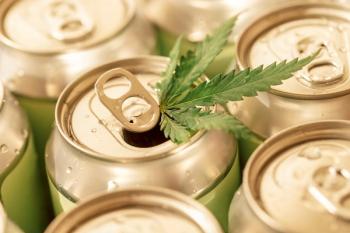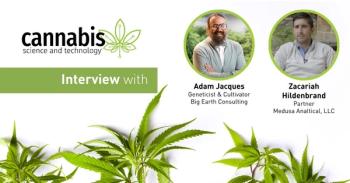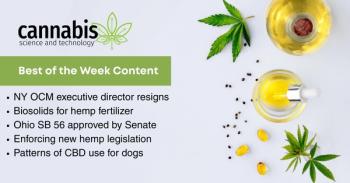
CSC West: Dr. Eberhardt Kuhn Looks to Advance Cannabis and Hemp Science

The science of cannabis is in its beginning stages and has a large opportunity for growth advancement. Market Manager for Cannabis for Shimadzu, Eberhardt Kuhn, Ph.D., will be presenting two talks for both the hemp and analytical tracks, “Starting with the Roots - the Many Uses of Hemp” and “Delta Dawn - the Next Generation of Cannabinoids?” If you are interested in exploring hemp or cannabidiol (CBD) and other cannabinoids, check out both of these presentations to learn more! In this interview, Kuhn also discusses his interests in the cannabis industry and other presenters at the Cannabis Science Conference (CSC) West taking place in Long Beach, California from May 18–20, 2022.
How did you get involved in the cannabis industry?
Eberhardt Kuhn: While cannabis has been used in some form or another for centuries, the science of cannabis is still in its infancy. So as a scientist, I was attracted to this dynamic and fascinating field from the beginning. When I joined the company, Shimadzu was already established as the leader in analytical solutions for the cannabis industry, and my boss, Dr. Bob Clifford, was a recognized authority in that market. He mentored me to become the Market Manager for Cannabis at Shimadzu Scientific Industry. And I’m very grateful and excited to serve in this role to help advance cannabis science.
At Cannabis Science Conference West, you are presenting two talks. Can you give us a little preview of your talk for the hemp track titled “Starting with the Roots - the Many Uses of Hemp”?
Kuhn: Hemp is a remarkable and very versatile plant and has been cultivated by humans for thousands of years. We all know about the benefits from the flower in terms of CBD. In my talk, I will highlight how the other parts of the hemp plant are being used to produce everyday products like clothes and shoes and paper. And, of course, as the title indicates, the health benefits of the hemp root. All this in the context of solutions for the quality control of these products.
What will your analytical talk titled “Delta Dawn - the Next Generation of Cannabinoids?” focus on?
Kuhn: The drop in value of CBD combined with the Hemp Farm Act have created a situation where CBD is chemically converted to different THC isomers. In my talk, I describe the chemistry of this conversion and the need to develop advanced analytical techniques (for example, LC–MS) to detect and identify the various “Delta X” isomers of THC.
What are you most excited to learn at the Cannabis Science Conference?
Kuhn: In addition to learning about the latest hemp and cannabis research, I am most excited about the new Psychedelics Track.This is such a hot new field that deserves a lot of attention.Right now, I know just enough to be dangerous and I’m hoping to learn more about the different types of psychedelics so I can become useful and make meaningful contributions towards the analytical aspect of Psychedelics.
Can you explain what tetrahydrocannabinol (THC) isomers are and why it’s important to learn more about them?
Kuhn: Isomers are defined as having the same molecular formula but different arrangement of the atoms.THC isomers differ in the position of a double bond within one of its rings.While that may seem like an insignificant difference, the receptors in our bodies are remarkably sensitive to even the slightest difference in molecular structure.Which means a person could have a different physiological reaction to, for example, the newer delta-8 THC isomer than the more widely studied and understood delta-9 THC.Remember that delta-9 THC is the predominant isomer occurring in cannabis plants. So, as more of the synthetic THC isomers (like delta 8) enter the cannabis consumer market, we need to understand how they affect the human body and assure that they are safe to consume.
What is the best method for measuring cannabinoids and terpenes found in hemp?
Kuhn: For cannabinoids, the best and most widely used technique is high performance liquid chromatography (HPLC). There are dedicated instruments, for example, the Hemp Analyzer from Shimadzu, that make this analysis easy and accurate.Terpenes are volatile compounds, so they are best analyzed by gas chromatography–mass spectrometry (GC–MS).Both headspace and liquid Injection are commonly used, depending on the actual sample and specific analytes.
In the cannabis industry, do you think there should be a uniform set of rules and regulations?
Kuhn: Absolutely!As cannabis consumption—both medicinal and recreational—becomes more mainstream, it is important to have a consistent set of rules and regulations across the entire country. I look at it as an extension of Food Safety. The FDA establishes guidelines and regulations to assure that the food we eat is safe. We need similar FDA guidelines and regulations to assure that any cannabis product at any dispensary anywhere in the country is safe to consume.
What would you like to see change in the cannabis industry in the next 5 years? How about in the hemp industry?
Kuhn: The big change I would like to see is managing the cannabis industry on a federal level.One of my focal points in cannabis science is “food safety”, that is, making sure cannabis products are safe to eat or smoke. To achieve that from an analytical perspective, we simply cannot have 50 different lists of pesticides or residual solvents. We need consistency across the entire country—one set of federal regulations and standards for every cannabis testing lab in the country.
As for the hemp industry, I’d like to see extended use of other parts of the hemp plant.I will elaborate more on this in my talk, but CBD from the flower is like the proverbial tip of the iceberg.The seeds and roots offer excellent health benefits.And the stalk is a “greener” alternative to crops like cotton (for fabrics) and trees (for paper).However, to help make hemp a more viable option for these products, regulators would have to relax the arbitrary rule of <0.3% THC.Raising that limit to, for example, 1.5%, could prevent an entire hemp harvest from having to be destroyed.And much like with cannabis, this would have to be a federal, nationwide regulation change.
Are there any other talks at the Cannabis Science Conference that you’re looking forward to hearing?
Kuhn: As always, there are a lot of great speakers talking about relevant and interesting topics.The one I look forward to the most is the Keynote presentation by Professor Richard van Breemen talking about his groundbreaking research on certain cannabinoids blocking the Coronavirus from entering our cells.This could be a game changer on how we deal with Covid-19.
Is there anything else you would like to add?
Kuhn: I like CSC because it offers the most relevant, interesting, and current cannabis and hemp science and research.My favorite part, though, is the Canna Boot Camp.It is such a fun and educational and interactive event.I would highly recommend the Canna Boot Camp to anyone new to the cannabis industry, or anyone looking for some close up, hands-on experience with any aspect of cannabis science, from cultivation to nutrients to sample prep to analysis to compliance.
Newsletter
Unlock the latest breakthroughs in cannabis science—subscribe now to get expert insights, research, and industry updates delivered to your inbox.




